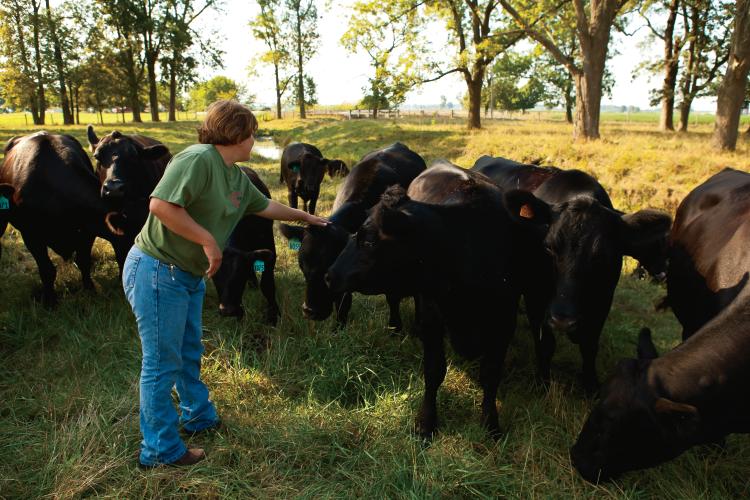Home > Lifestyle > Food For Thought > Happy Animals: Beef Cattle Need a Healthy Diet and Good Care
Happy Animals: Beef Cattle Need a Healthy Diet and Good Care
Many moms are concerned about what their kids eat. It’s just as important for farmers, including those raising cattle for beef, to be concerned about what their animals eat.
The farmers at Dougherty Farm Fresh Beef, a 2,000-acre, third-generation family farm in Indiana, have chosen to raise Black Angus cattle for their high quality and superior marbling.
“Quality is more [important] than the breed. How the beef is cared for and fed makes a big difference,” says Abby Nichols, who runs the beef operation with other family members. “It’s not uncommon to find me out there petting on them.”

Dougherty cattle – those processed for freezer beef – are fed a grain-based diet using corn grown on the farm, which reduces feed costs. But Nichols notes that the main reason their beef is grain-fed as opposed to 100 percent grass-fed is to enhance the quality of the meat for her customers.
“We do our best to raise a premium product, and a corn-fed diet helps to aid in marbling and overall taste of the beef,” she explains. “The cattle also simply love the corn!”
The beef cattle are also fed hay and grass, as well as a soybean-based supplement to add protein to their diet.
Nichols’ “mama cows,” on the other hand, enjoy a diet of hay, grass and, in the winter, corn silage. “This is just where the entire corn plant has been chopped up and fermented in silos,” Nichols says.
The family even planted a special turnip crop last year to extend the grazing season. “After August, it is difficult in Indiana to keep a good quality forage or grass for the cows,” Nichols says, explaining that they need to save the hay to get through winter and early spring.
These cows, Nichols says, need a diet that maintains body weight and supports a healthy pregnancy. “With the cattle going in to freezer beef,” she says, “we are feeding a diet for a premium beef product.”
The cattle are also raised free of added hormones, implants or antibiotic injections. “We’ve never felt the need to use artificial chemicals in our cows,” Nichols says. “Our cows finish quickly on their own, and working without added hormones makes the meat more tender.”
Dougherty beef comes from younger cattle – generally around 16 months – and is also dry aged, which means it hangs in a cooler for two weeks before processing, allowing the enzymes to work on the meat, which also increases tenderness.
“We work hard to make our beef a better product, and our customers appreciate buying locally,” Nichols says. “People have moved away from the farm and have such an interest in getting a connection back to it.”
All Dougherty beef is processed at state-inspected facilities and stored in carefully controlled and inspected freezers to ensure the beef is kept at the right temperature and labeled accurately. Fewer steps to the table means fresher product with fewer opportunities for food safety problems.
Beyond beef, the Dougherty farm raises corn and soybeans, plus a little hay and wheat, and also includes a fertilizer and crop protection retail business. All aspects of the business are family managed by Abby and Zach, as well as Abby’s father, David Dougherty, and Zach’s father, Bruce Dougherty.
“It’s probably every farm person’s dream to have their children take away the lessons they’ve learned on the farm,” says Nichols. “Whatever your passion becomes, the lessons and work ethic grown on the farm will help you to do it better.”
Find more articles on Indiana family farms and animal care.



